When the Grenfell Tower disaster struck, the Bishop of Kensington cleared his schedule to help mobilise local Christians to assist with the relief effort. One year on, he says the job is far from over
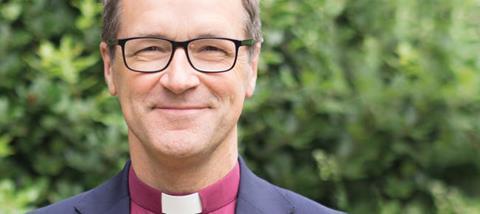
Instinct took over on the morning of 14 June 2017. After switching on the news to see Grenfell Tower engulfed in flames, Rt Rev Dr Graham Tomlin, Bishop of Kensington, recognised the significance of the moment and cancelled his plans for the day.
Britain’s worst fire in a century claimed 71 lives and left an entire community devastated. In the midst of the tragedy, local Christians responded quickly as churches of all denominations opened their doors to grieving members of the public, offering both practical and spiritual assistance. In the hours that followed, the bishop found himself counselling local residents and the emergency services. As the media machine descended he also became a spokesperson for the good work being undertaken by churches in the area. And one year on from the disaster, he's still speaking up for local people and delivering a hard hitting message about inequality, housing and the dangers of individualism.
Graham Tomlin never set out to become a bishop (and he’s “suspicious” of those who do). His background is in academic theology – he was vice principal at Wycliffe Hall, Oxford, before helping to establish what is now the UK’s largest ‘vicar factory’ – St Mellitus College, where there are more than 250 Church of England ordinands in training. Like Justin Welby, Archbishop of Canterbury, Tomlin comes from the evangelical charismatic wing of the C of E and has strong ties with Holy Trinity Brompton.
The pastor-theologian is nearly 60, but could easily be mistaken for a 40-something. He’s friendly, confident and handles tough questions with his trademark warmth. While careful with his words, he isn’t overly guarded. When I suggest that his ‘establishment’ position as a Church of England bishop and his impressive academic background might be off-putting to some non-Christians, he’s honest: “Yes, that’s right, and it’s an issue that we – not just the Church of England, but the whole Church in the UK, have to grapple with...There are large parts of society who we’re not yet touching…”
Tomlin describes his calling as “helping people to understand the Christian faith”. He’s done this in part by hosting one of the UK’s most popular Christian podcasts. Each episode of GodPod involves a wonderfully civilised theological discussion between some of Christendom’s biggest brainboxes. The fact it’s all done over tea and biscuits (and features some excellent accents) has given the show a quintessentially British flavour.
It’s easy to see why bishop Graham is popular among evangelicals. His first-rate intellect is aided by an appreciation of “the affective, emotional side of faith” and his engagement with social issues hasn’t dampened his passion for preaching the gospel. He’s also a bridge builder; during our interview he often pauses to acknowledge it wasn’t just Christians who sprang into action following Grenfell, but Muslims too. “It was just one of those brief moments when we lost our fear of each other. So many times we just live in these little pockets where we talk to our friends, our neighbours and no one else. But somehow, for that brief moment, everyone thought: ‘We’ve got to do something to help.’”
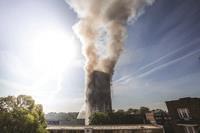
You grew up the son of a Baptist minister but you went through a period of atheism in your teens. What happened?
I was always an intellectual nerd and my rebellion was not sex, drugs and rock and roll: it was reading Nietzsche.
I thought I had more questions than the Christian faith could answer, so I rejected it. I remember reading the Bible and trying to find the mistakes. My parents kept on making me go to church during this time. When I look back on it now, it feels like what I rejected was a very childish form of Christian faith.
I had a group of Christian friends who stuck with me and didn’t abandon me. What drew me back to faith was I began to find some answers to the questions that I had. I realised there was a much greater richness and depth to Christian faith. Also, there was something about the Christian friends I had that really impressed me. It’s a bit of a cliché, but I thought: “They have something that I don’t” – and whatever it was, I wanted it.
You went to grammar school and then the University of Oxford. Was your intellectual appetite there from an early age?
I think it was always important to me that Christian faith made sense. It wasn’t just an emotional journey.
Not that you can explain it all rationally, as Augustine says: “If you can understand it, it’s not God.” So there’s an element of grappling with something that is beyond you. But at the same time there is an internal coherence to Christian faith, and trying to understand that has always been quite important to me.
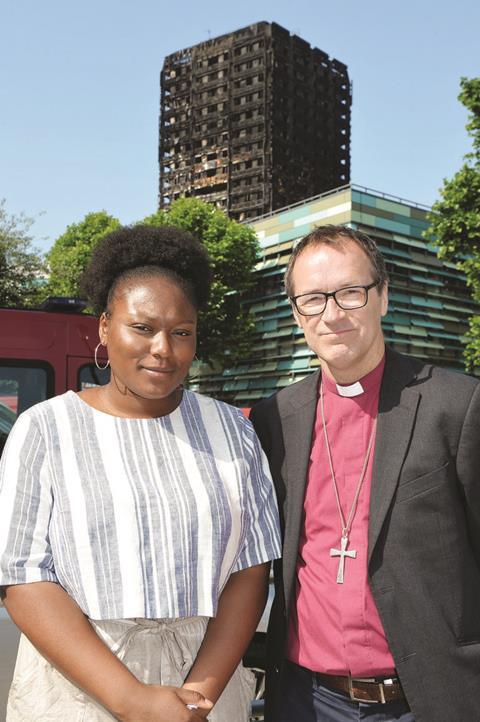
You’ve been studying theology for a long time. What have you changed your mind on?
When I started out, I think I saw the Holy Spirit as a fairly minor part of Christian understanding. I think I was a little wary of the emotional side of Christian faith – maybe that’s a tendency for people like me who like to think our way around our faith.
I have come to see that without the Spirit we cannot worship God, understand the Bible, or feel any love or desire for God, or have any hope of growing in these things. I’ve become more aware of the need to continually ask for the Spirit’s presence and help as a conscious act of invitation, because it is only the Spirit who can enable us to experience the love of God, and it’s vital to do that.
Were you surprised to be made a bishop?
In one sense, yes; I certainly never set out to be a bishop. I remember having conversations that it’s the last thing I’d want to do – “Who’d ever want to be a bishop?”
I’m always quite suspicious of people who set out to become bishops. But, I guess as time drew on, I had a number of conversations with the then-Bishop of London, Richard Chartres, and he was saying to me: “I think you want to think about this…”
I thought: “Yes, this idea of oversight, of thinking about the whole life of the Church, rather than just the individual church” – it seemed to ring a lot of bells with me.
What are your memories of the morning of the Grenfell Tower disaster?
The way I found out was actually from Premier Christian Radio. I woke up at 6am, which is what I normally do, and I looked at my phone and saw a message asking me to comment on the fire. So, of course I thought: “What fire?”
I went online and discovered that this tower block had caught fire in one of my parishes. It was one of those instinctive moments where I realised I just had to drop everything.
I quickly called round a couple of other clergy and got a little team of people together. I think we were the only non-emergency services people allowed into the base of the tower on the day. I spent much of the morning with fire fighters, talking with them as they were going in and out, just reassuring them, listening to their stories, trying to tell them what they do really matters and that everybody else in the country is rooting for them.
I spent half the morning doing that, half the morning back in St Clement’s church, which had opened its doors at 3am, and by this stage was full of very bewildered people – many of them still in their pyjamas – wandering around. The church was full of donations that were being brought in – it was immediately becoming a kind of emergency centre.
Can you tell us more about the local churches and how exactly they galvanised into action?
It’s quite a religious area; not all Christian, of course: a large number of Muslims in the area. But faith really matters, so faith communities matter too.
I think the great thing about churches is that they’re on the ground. We don’t have to parachute ourselves in: every incident happens in a parish.
St Clement’s became a centre for people to bring goods, clothes, donations, for local people. I remember people were driving down, saying: “I’ve come from Wolverhampton and here’s my bag of clothes that I’ve gathered together and I want to give it to the people of Grenfell.” They came to north Kensington, they gave their time and people did what they could.
There was also a liturgical aspect. We put on a service in one of the local churches on the Friday after the fire – a very quiet, reflective service, just enabling people to process it, to have a moment of stillness.
Do you ever wonder what would have been different had the churches not been there?
I think there would have been much more of a sense of: “Where do we go?” It’s very significant that in those moments, people went to the faith centres.
We have a motivation for opening our doors: to make sure that we do whatever we can to love our neighbour, not just to tolerate our neighbour – the person that God has put next door to us, whatever they may look like and whatever they may be like. We are motivated by our belief that every single human being is someone for whom Christ died and who is made in the image of God: valuable, regardless of their background, colour or religion.
You also found yourself being interviewed by much of the media. Did anything prepare you for that?
You are given a little bit of media training when you become a bishop. But no one quite prepares you for something of that magnitude. It was very interesting to watch the whole 24/7 media machine descending upon a local community…which was both fascinating and disturbing in some ways.
Did the media’s presence raise ethical questions for you?
I think there is something about the 24/7 media beast that just needs feeding. There was media from all over the world and everybody wanted an interview with someone. Sometimes that was fine because obviously a story needs to be told. But sometimes that was quite intrusive.
I did many, many interviews over those few days, and one of them we actually had to stop because one of the local people was so angry and annoyed by the intrusion into people’s lives.
I remember talking to one of the local residents – a very intelligent man who gave quite a long interview offering his thoughts and reflections. But the only bit that was actually put on TV was the bit when he burst into tears. It was almost as if they were after the emotion not the argument, which did seem to me a bit irresponsible.
There was certainly a degree of intrusiveness into quite a traumatised community at that time, which really did not help. And to be honest, I think it’s one of the issues that we’re going to be facing now, because they’re still a very traumatised community. With the year anniversary there is going to be a lot of media interest raking up things that may just be beginning to settle in people’s lives.
In the days following the disaster, there seemed to be a huge amount of anger. Was that righteous anger?
I think there was a feeling that warnings were not heeded. It felt like it shouldn’t have happened in a 21st century city like London. There were warnings about the state of the tower, the quality of the cladding, the upkeep of that tower that weren’t listened to. You can understand the anger of local people when something like this happens.
What is the situation now, one year on?
There are around 210 families who need rehousing – the number’s been creeping up – but over half are still not in permanent housing. Many of them are in emergency accommodation, in other words, hotel rooms. They still don’t know where they are going to be living long-term.
There’s still a lot of distress locally. You’ve got people who lost close friends, family members, people who’ve lost their homes, who’ve lost everything – through no fault of their own. They went to bed on an ordinary summer evening like we all do, and suddenly you wake up and your entire life has been torn apart. And it seems to me we have a responsibility as a society when something like that happens to do everything we possibly can to help get people back on their feet.
Who’s to blame? There is a feeling locally that there was an unwritten policy to gentrify the area, and gradually neglect social housing because at the end of the day, if we sell it off to overseas investors then we can make more money out of it. I’m not saying that’s right or wrong – but there is a perception of that in the local area. There’s been all kinds of speculation as to who was to blame, but the public inquiry has that job to get to the bottom of it. Without that truth, you can’t get to justice, and without justice you can’t get to reconciliation. And that’s the ultimate goal here: reconciliation.
To hear the full interview, listen to Premier Christian Radio at 4pm on Saturday 9 June, or download The Profile podcast
Read/watch Bishop Graham Tomlin's Premier Lecture on ‘Rebuilding Community after Grenfell’














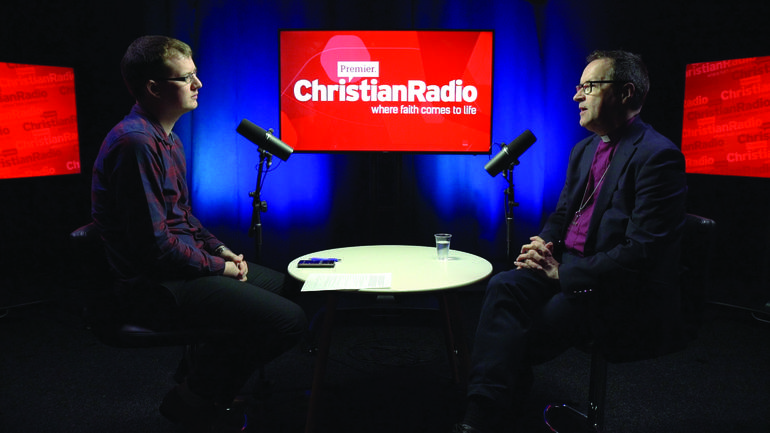
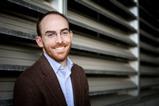






















No comments yet